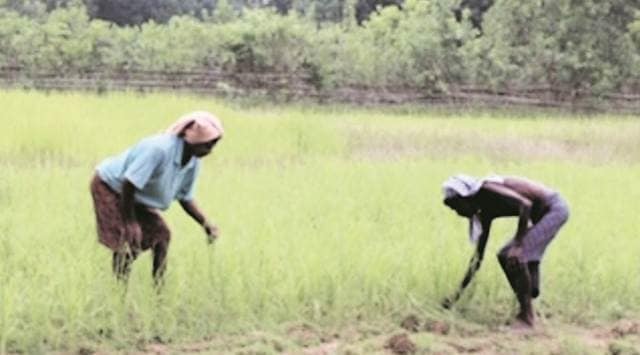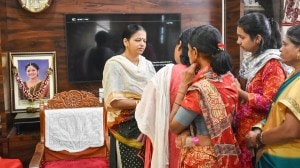- India
- International
Maharashtra WCD launches virtual platform to empower women farmers, strengthen farm-to-market links
The initiative comprises an e-business platform, which can also be operated offline and collects details about farmers, like the type of produce they supply – cereals, pulses, vegetables, fruits, goats chicken and eggs – as well as variety, quantity and location.

To mitigate the impact of Covid-19 and address problems related to food security and nutrition caused by lockdown-induced supply chain disruptions, the Women and Child Development Department (WCD) has launched a novel initiative to empower women farmers and improve linkages between farms and markets.
The initiative comprises an e-business platform, which can also be operated offline and collects details about farmers, like the type of produce they supply – cereals, pulses, vegetables, fruits, goats chicken and eggs – as well as variety, quantity and location. “We have called the platform and dashboard e-Business, where the information is aggregated in real-time and reflected in a dashboard,” I A Kundan, secretary, WCD, Maharashtra told The Indian Express.
It was launched recently by WCD Minister Yashomati Thakur under the slogan ‘Saksham Mahila, Suposhit Maharashtra’. A team of frontline workers of Mahila Arthik Vikas Mahamandal (MAVIM) – a state women’s development corporation – underwent online training on how to use the e-Business platform to collect information from farmers.
Shraddha Sharma, managing director, MAVIM told The Indian Express that they had surveyed 3.5 lakh women and found many problems related to food security and nutrition. Sometimes, these women just had rice and salt, she said. “The traditional supply chain was disrupted due to the lockdown. This e-Business platform was launched so that at one click, we get information about how many women are, for example, involved in producing pulses such as tur, the different varieties, quantity and live position of the farm,” Sharma said.
The system also captures a complete farmer profile: the size and type of land and availability of crop insurance. It can support in planning institutional market linkages for agricultural produce, in targeted interventions such as provision of seeds, fertilisers, insurance and training.

For women farmers like Kranti Uphade, going to the wholesale market itself is a challenge. “The markets have their own challenges for us women, so getting the best price is not easy,” said Uphade, who is from the Takali Budurk village in Latur. Uphade, who grows soyabean and chana, often has to rely on her neighbours or relatives to sell her produce. An online platform, she said, would be the best for a farmer like her as she can make the best bargain. “This is indeed a welcome move,” she said.
Rasika Kadam, another farmer from Mohadi village in Dindori taluka, Nashik, said the online platform will help in breaking down the geographical barriers for her vegetables and grapes. Kadam grows tomato and cauliflower over two of her 12 acres, the remaining being a vineyard. “Normally my produce goes only to markets in Nashik and Pimpalgaon, but if there is an online plaftform, I will be able to access markets in Pune, Mumbai and other places,” she said.
Farmers with low agricultural productivity, lack of crop insurance and non-irrigated land are more vulnerable. The platform identifies such farmers and can link them to storage facilities as well as identify ideal locations for accessing warehouses.
There are as many as 16 lakh women across 10,000 villages who are supported under MAVIM, and four lakh women’s self-help groups in the state. “Of these 16 lakh women, some are in the business of making pickles or masalas. While we want to rope in everyone, the focus initially was on women involved in agri-produce – fruits, vegetables, grains and pulses, rearing goats and poultry farming,” said Varun Thampi, programme officer with the state nutrition mission.
Thampi, along with Karan Palaskar, was involved in developing the system and worked closely with the MAVIM team. The platform was launched as a pilot project in Thane and Amravati. “We have covered 1.5 lakh women on the system and now, efforts are underway to bring in more,” Thampi said.
In Amravati, using information collected by frontline workers, MAVIM officers were able to identify the location and number of goats that could be sold by goat farmers, officials said. Using the e-Business platform to plan linkages, at least 128 goats have been sold for Rs. 5.5 Lakh in the district so far. Since the sale was made in bulk, the women were able to get better rates. Where the usual mode of sale in the unorganised market would have yielded a price of Rs 3,300-3,500 per goat, the goats were sold at Rs 4,000-4,200 per goat (20 per cent higher), sources said. According to the WCD secretary, this intervention has helped them mitigate the impact of Covid-19 by facilitating bulk institutional sale of goats, leading to better prices.
In Thane, several small vegetable farmers faced difficulties in selling their produce during the lockdown. Frontline MAVIM workers were able to gather information from 3,000 farmers about the type of vegetables, available quantity as well as variety and location of farms. Then recently, they were able to sell at least 1,200 kg of vegetable produce to Go4Fresh, a private company that aggregates fresh fruits and vegetables and supplies to wholesale buyers, food processors and exporters. As a result, the women farmers were each able to earn Rs 30,000, officials said.
Sunita Dhanwade, chairman of Punyastham Farmers Producers Company in Puntambha village, Shirdi taluka of Ahmednagar district, welcomed the initiative. “This online platform will surely help players like ours get a bigger field,” she said.
Apr 26: Latest News
- 01
- 02
- 03
- 04
- 05







































